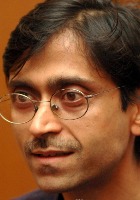Prologue Poem by Makarand Paranjape
Prologue
Introductions, so they say, mustn't be too long;
But I can't exactly promise to obey that law.
There are, I take it, many texts in this post-structural age,
In which introductions become interminable
Because, quite simply, there's nothing to introduce,
No main body, no inner chamber, no sanctum designate,
Nowhere to lead into, nowhere to 'intro ducere':
Just mazes, passages, and entrances,
Decentred disseminations of differance.
So these poems may lead nowhere but back to myself,
Voices in my own consciousness seeking release and play.
In that sense, isn't love an internal adjustment,
The sport of Shiva and Shakti which leads to endless jouissance.
If that's the case, there's only one love story, not many,
And we all enact different versions of it.
So much for the philosophical presuppositions of this text,
None of which need be taken too seriously.
Now to its artistic and aesthetic bases:
These are harder far to ignore or neglect.
Love poetry, everybody knows, has been written in all ages and climes,
And starting a new love poem must necessarily induce
An almost insurmountable anxiety of influence.
Remember Jessica and Lorenzo in 'The Merchant of Venice',
Those rather unimportant side-kicks to the protagonists?
How even they recalled the whole prehistory of lovers
When finally alone and face to face on a bright moonlit night:
The lovers' list that they invoked, of Cressida and Troilus,
Of Thisbe (and, by implication, Pyramus) , of Dido and Aeneas,
Of Medea and Jason, is formidable enough and would be even longer,
But for a timely interruption by the device of a Shakespearean messenger.
So whom should I invoke? Our great poets, Kalidasa and Bharatrihari,
Or the enduring tradition of the sport of Krishna, our greatest lover,
Or, skipping centuries, should I remember such historical lovers
As Prithviraj and Samyukta, or Shah Jehan and Mumtaz Mahal?
Or legends such as Laila-Majnun, Shirin-Farhad, Heer-Ranjha?
Or crossing centuries and epistemes again, meditate on Raj and Nargis-
Not so much in real life as in the movies-or to bring myself up to date,
Yash Chopra's latest fantasy, 'Chandani' enacted by inimitable Sridevi?
The point is that all new love stories are grounded in older ones.
I wish, though, that this spiel on the intertextuality of love tales
Would silence my own uncertainties and fears.
Simply put, they are: what's so great about this love story?
The lovers are neither rich, nor beautiful, nor glamorous:
Both 'S' and 'M' are just ordinary, urban, bourgeois kids,
So why celebrate their love? What's so special about them?
Did they break the rules, create scandals, cheat on each other,
Or were they star-crossed lovers doomed together?
Or is their claim to celebrity and immortality
Founded on some other outrageous and flamboyant perversity?
The answers, I am afraid, are all in the negative:
They're just like anyone else, nothing really to write poetry about.
She studied in Lady Irwin College and he in St Stephen's.
Though they were distantly related, they hadn't really met until then.
They fell in love and went through the usual difficulties-
All this happened in Delhi in the late 1970's.
Eventually, they got married in the USA.
And after spending four or five years there they returned
To India to take up respectable, but fairly mundane employment.
After this, there is little to tell: in any case,
Most of these biographical details are irrelevant to the poems.
She turns thirty, not a very romantic age,
But he falls in love with her again-
Or so he thinks he should like to believe-
And decides to celebrate the event
By sending her thirty or nearly thirty poems-
Kama's arrowheads-and hence this collection.
I have been very honest, this, dear reader, you cannot deny,
Spelling out everything in a fairly straight forward way.
In addition to all the usual problems of language,
And the contradictions of the post-colonial age,
There's nothing great about these poems,
Nothing much to analyze or explicate:
They have the usual influences-in this Prologue itself,
For instance, you may find some Rushdie or Seth-
Take your pick, but in any case, the style is cliche-ridden.
If there are still a few things that I have left out
The omissions can't be of much significance.
As an English teacher, you know,
I am always available for explanation or comment.
But now, if you excuse me,
I should get on to the main subject,
Which, as you by now know only too well,
Is love, love, love-and if you'll accept my parting advice,
Kindly forget all that I've said
In what I realize has been a very prosaic preface.
[From The Serene Flame]
This poem has not been translated into any other language yet.
I would like to translate this poem